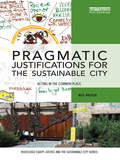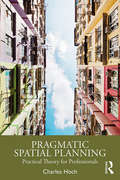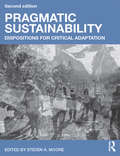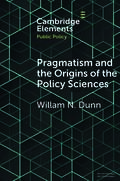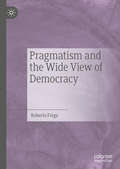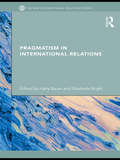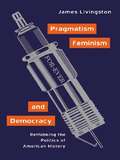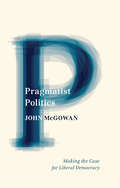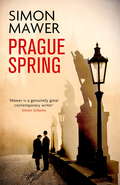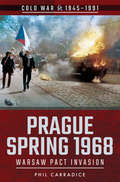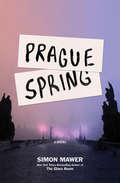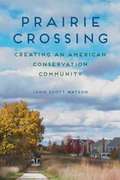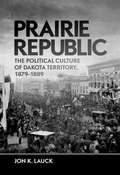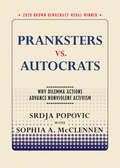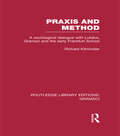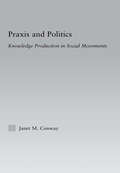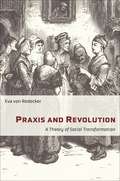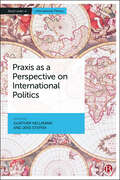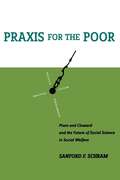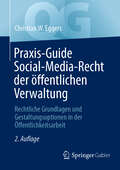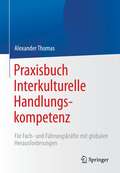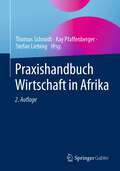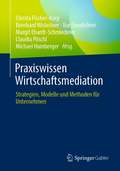- Table View
- List View
Pragmatic Justifications for the Sustainable City: Acting in the common place (Routledge Equity, Justice and the Sustainable City series)
by Meg HoldenWhat can justice and sustainability mean, pragmatically speaking, in today’s cities? Can justice be the basis on which the practices of city building rely? Can this recognition constitute sustainability in city building, from a pragmatic perspective? Today, we are faced with a mountain of reasons to lose hope in any prospect of moving closer to justice and sustainability from our present position in civilization. Pragmatic Justifications for the Sustainable City: Acting in the Common Place offers a critical and philosophical approach to revaluating the way in which we think and talk about the "sustainable city" to ensure that we neither lose the thread of our urban history, nor the means to live well amidst diversity of all kinds. By building and rebuilding better habits of urban thinking, this book promotes the reconstruction of moral thinking, paving the way for a new urban sustainability model of justice. Utilizing multidisciplinary case studies and building upon anti-foundationalist principles, this book offers a pragmatic interpretation of sustainable development concepts within our emerging global urban context and will be a valuable resource for both undergraduate and postgraduate students, as well as academics and professionals in the areas of urban and planning policy, sociology, and urban and environmental geography.
Pragmatic Spatial Planning: Practial Theory for Professionals
by Charles HochInstead of seeking theory to justify practical professional judgments this book describes how professionals can and should use theory to guide these judgments. Professional spatial planning in the US, and globally, continues to suffer from a weak conceptual grasp of its own practice. Practitioners routinely recognize the value and wisdom of practical judgment finely attuned to context, nuance and complexity; but later offer banal testimony and glib stories of ‘just so’ best-practice discrediting the ambiguity of their own experience. The chapters in this book provide a vocabulary tailored to the conventions of practical judgment, challenging students and practitioners to treat professional expertise as work in progress rather than ‘best’ practice. Instead of seeking theory to justify practical professional judgments, Hoch describes how professionals can and should use theory to guide these judgments. The pragmatist plan helps cope with complexity rather than control it, making it invaluable in the anyone’s pursuit of a planning career. This book will appeal to a wide cross section of students and scholars, especially those working in urban planning, public policy, and government.
Pragmatic Sustainability: Dispositions for Critical Adaptation
by Steven A. MooreThis second edition of Pragmatic Sustainability proposes a pragmatic, discursive and pluralistic approach to thinking about sustainability.. Rather than suggesting a single solution to the problem of how to live sustainably, this collection discusses broader approaches to social and environmental change. Eight continuing authors and seven new ones adjust their dispositions toward rapidly changing and still unsustainable conditions, forging agreements and disagreements on five overlapping themes: the Grounds for Sustainability; the critique of Technological Culture; the need to conceive of Sustainability in Place; in Cities; finally asking how should we reimagine the fraught relationship between Civil Society, Industry and Regulation? Editor Steven A. Moore asks how a set of ideas now more than a century old remains relevant. A partial answer can be found in reconstructing the very modern ideas confronted by those who came to call themselves Pragmatists at the beginning of the twentieth century—evolution, ecology and design. Moore argues that we have yet to develop dispositions in theory and practice that critically integrate these ideas into sustainable development. In sum, this new edition provides a fresh and hopeful look at the wicked problems deliberated by almost anyone engaged in adapting to the always changing conditions of the built world.
Pragmatism and the Origins of the Policy Sciences: Rediscovering Lasswell and the Chicago School (Elements in Public Policy)
by William N. DunnAn examination of the origins of the policy sciences in the School of Pragmatism at the University of Chicago in the period 1915-1938. Harold D. Lasswell, the principal creator of the policy sciences, based much of his work on the perspectives of public policy of John Dewey and other pragmatists at Chicago. Characteristics of the policy sciences include orientations that are normative, policy-relevant, contextual, and multi-disciplinary. These orientations originate in pragmatist principles of the unity of knowledge and action and functionalist explanations of action by reference to values. These principles are central to the future development of the policy sciences.
Pragmatism and the Wide View of Democracy
by Roberto FregaThe aim of this book is to provide a fresh, wider, and more compelling account of democracy than the one we usually find in conventional contemporary political theory. Telling the story of democracy as a broad societal project rather than as merely a political regime, Frega delivers an account more in tune with our everyday experience and ordinary intuitions, bringing back into political theory the notion that democracy denotes first and foremost a form of society, and only secondarily a specific political regime.The theoretical shift accomplished is major. Claiming that such a view of democracy is capable of replacing the mainstream categories of justice, freedom and non-domination in their hegemonic function of all-encompassing political concepts, Frega then argues for democracy as the broader normative framework within which to rethink the meaning and forms of associated living in all spheres of personal, social, economic, and political life. Drawing on diverse traditions of American pragmatism and critical theory, as well as tackling political issues which are at the core of contemporary theoretical debates, this book invites a rethinking of political theory to one more concerned with the political circumstances of social life, rather than remaining confined in the narrowly circumscribed space of a theory of government.
Pragmatism in International Relations (New International Relations)
by Elisabetta Brighi Harry BauerThis collection of essays introduces pragmatism to the study of international relations and evaluates its potential for the theory and practice of global politics. Seeking to reorient the discipline of International Relations (IR) towards practices and problematic situations, the editors of this volume draw on the pragmatist tradition to provide critical inspiration for this task. Their book, organised into four distinct parts, aims to outline the potential of pragmatism to reconstruct IR. Through such an approach this volume seeks to re-invigorate the discipline and bridge the gap between IR academic communities in the US, UK, and continental Europe. This pioneering volume provides: the first book-length evaluation of the potential pragmatism holds for the practice as well as the epistemological, theoretical and normative debates within the discipline of IR theoretical reflections and empirical studies in the area of diplomacy, international law, public (environmental) policy and the Arab-Israeli conflict highly original contributions by prominent scholars in the field of IR, International Law, Sociology and Social Theory Drawing on research from several disciplines, Pragmatism in International Relations will be vital reading for students and scholars of International Relations, International Relations Theory, and Social Theory.
Pragmatism, Feminism, and Democracy: Rethinking the Politics of American History
by James LivingstonPragmatism, Feminism, and Democracy is James Livingston's virtuoso reflection on the period between 1890 and 1930, a primal scene of American history during which a wave of intellectual currents came together--and fell apart--to reorient society. Tying in critical insights on corporate capitalism, consumer culture, populism, and the American Left, Livingston analyzes the intersections and similarities of pragmatism and feminism to yield an original, provocative blend of historiography, feminist theory, and American intellectual history.
Pragmatist Politics: Making the Case for Liberal Democracy
by John McGowanIn our current age of cynicism, John McGowan suggests that the time is right to take a fresh look at pragmatism, the philosophy of American democracy. As McGowan shows, pragmatism can be an inspiring alternative to the despair that seems to dominate contemporary American politics. Pragmatist Politics is passionate and convincing, both heartfelt and clear-eyed. It offers an expansive vision of what the United States could be and should be.From John Dewey and William James, McGowan derives a history of democracy as a way of life, characterized by a distinctive ethos and based on an understanding of politics as potentially effective collective agency. That democratic ideal is wedded to a liberalism that focuses on extending the benefits of democracy and of material prosperity to all. Beyond the intellectual case for liberal democracy, McGowan turns to how James, especially, was attuned to the ways that emotional appeals often trump persuasion through arguments, and he examines the work of Kenneth Burke, among others, to investigate the link between liberal democracy and a comic view of human life. Comedy, McGowan notes, allows consideration of themes of love, forgiveness, and generosity that figure far too infrequently in philosophical accounts of politics.In McGowan&’s work, the combination of pragmatism and comedy takes us on a wide-ranging exploration of what American politics—and by extension American life—could actually be like if it truly reflected American values.
Prague Spring
by Simon Mawer'Prague Spring is a wonderfully atmospheric portrait of the city as well as a political and historical thriller with dashes of espionage. It is as brilliant as anything he has written, which is saying a lot' The TimesIt's the summer of 1968, the year of love and hate, of Prague Spring and Cold War winter. Two English students, Ellie and James, set off to hitch-hike across Europe with no particular aim in mind but a continent, and themselves, to discover. Somewhere in southern Germany they decide, on a whim, to visit Czechoslovakia where Alexander Dubcek's 'socialism with a human face' is smiling on the world.Meanwhile Sam Wareham, a first secretary at the British embassy in Prague, is observing developments in the country with a mixture of diplomatic cynicism and a young man's passion. In the company of Czech student Lenka Konecková, he finds a way into the world of Czechoslovak youth, its hopes and its ideas. It seems that, for the first time, nothing is off limits behind the Iron Curtain.Yet the wheels of politics are grinding in the background. The Soviet leader, Leonid Brezhnev is making demands of Dubcek and the Red Army is massed on the borders. How will the looming disaster affect those fragile lives caught up in the invasion?
Prague Spring
by Simon Mawer'Prague Spring is a wonderfully atmospheric portrait of the city as well as a political and historical thriller with dashes of espionage. It is as brilliant as anything he has written, which is saying a lot' The TimesIt's the summer of 1968, the year of love and hate, of Prague Spring and Cold War winter. Two English students, Ellie and James, set off to hitch-hike across Europe with no particular aim in mind but a continent, and themselves, to discover. Somewhere in southern Germany they decide, on a whim, to visit Czechoslovakia where Alexander Dubcek's 'socialism with a human face' is smiling on the world.Meanwhile Sam Wareham, a first secretary at the British embassy in Prague, is observing developments in the country with a mixture of diplomatic cynicism and a young man's passion. In the company of Czech student Lenka Konecková, he finds a way into the world of Czechoslovak youth, its hopes and its ideas. It seems that, for the first time, nothing is off limits behind the Iron Curtain.Yet the wheels of politics are grinding in the background. The Soviet leader, Leonid Brezhnev is making demands of Dubcek and the Red Army is massed on the borders. How will the looming disaster affect those fragile lives caught up in the invasion?
Prague Spring 1968: Warsaw Pact Invasion (Cold War, 1945–1991)
by Phil CarradiceA historian&’s overview of Czechoslovakia&’s Alexander Dubček, the Prague Spring of 1968, and the Warsaw Pact Invasion. Cold War nadir: January 1968 and in Czechoslovakia, the new Communist Party leader, Alexander Dubcek, has made it clear that this is the opportunity to loosen the Soviet stranglehold on the country. As the Prague winter slowly eases into a Prague spring, it really does seem as if Dubček has judged it right. Reforms in oppressive censorship laws, improved housing, a lessening of totalitarian oppression, Dubček promises and delivers on it all. The new regime in Czechoslovakia does seek to destroy communism but it does want to choose its own political destiny. And then, on the night of 20/21 August, the Prague Spring is crushed by the Warsaw Pact invasion: 200,000 Communist troops, mostly Soviet but also Polish and East German, flood the country. The resulting protests and rallies against the invasion, mostly by young people, are violent and bloody. Hundreds die in clashes; self-immolation, in public and before the eyes of the world, brings home the horror and the depth of feeling in the Czech people. It is the end of the Prague Spring, the reformation of Czechoslovakia having ended in ruins. But despite the brutal crushing of Czech hopes and dreams, the events of 1968 lay the foundations for future change. It will take another two decades but it is, ultimately, where the unraveling of the Communist bloc begins.
Prague Spring: A Novel
by Simon MawerNew York Times bestselling author of The Glass Room Simon Mawer returns to Czechoslovakia, this time during the turbulent 1960s, with a suspenseful story that mixes sex, politics, and betrayal.In the summer of 1968--a year of love and hate, of Prague Spring and Cold War winter--Oxford students James Borthwick and Eleanor Pike set out to hitchhike across Europe, complicating a budding friendship that could be something more. Having reached southern Germany, they decide on a whim to visit Czechoslovakia, where Alexander Dubček's "socialism with a human face" is smiling on the world.Meanwhile, Sam Wareham, First Secretary at the British embassy in Prague, is observing developments in the country with both a diplomat's cynicism and a young man's passion. In the company of Czech student Lenka Konečková, he finds a way into the world of Czechoslovak youth, its hopes and its ideas. For the first time, nothing seems off limits behind the Iron Curtain. Yet the wheels of politics are grinding in the background. The Soviet leader Leonid Brezhnev is making demands of Dubček, and the Red Army is amassed on the borders. How will the looming disaster affect those fragile lives caught up in the invasion?With this shrewd, engrossing, and sensual novel, Simon Mawer cements his status as one of the most talented writers of historical spy fiction today.
Prairie Crossing: Creating an American Conservation Community
by John Scott WatsonCarved out of century-old farmland near Chicago, the Prairie Crossing development is a novel experiment in urban public policy that preserves 69 percent of the land as open space. The for-profit project has set out to do nothing less than use access to nature as a means to challenge America's failed culture of suburban sprawl. The first comprehensive look at an American conservation community, Prairie Crossing goes beyond windmills and nest boxes to examine an effort to connect adults to the land while creating a healthy and humane setting for raising a new generation attuned to nature. John Scott Watson places Prairie Crossing within the wider context of suburban planning, revealing how two first-time developers implemented a visionary new land ethic that saved green space by building on it. The remarkable achievements include a high rate of resident civic participation, the reestablishment of a thriving prairie ecosystem, the reintroduction of endangered and threatened species, and improved water and air quality. Yet, as Watson shows, considerations like economic uncertainty, lack of racial and class diversity, and politics have challenged, and continue to challenge, Prairie Crossing and its residents.
Prairie Republic: The Political Culture of Dakota Territory, 1879-1889
by Jon K. LauckAMERICAN DEMOCRATIC IDEALS, civic republicanism, and Christianity were the dominant forces at work during South Dakota's formative decade. Territorial politics in the late nineteenth-century West is typically viewed as a game of unprincipled opportunism or as a drunken exercise in bombast and rascality. Now, Jon K. Lauck examines anew the values we like to think were at work during the founding of our western states. Taking Dakota Territory as a laboratory for examining a formative stage of western politics, Lauck finds that settlers from New England and the Midwest brought democratic practices and republican values to the northern plains and invoked them as guiding principles in the drive for South Dakota statehood. Prairie Republic corrects an overemphasis on class conflict and economic determinism, factors posited decades ago by such historians as Howard R. Lamar. Instead, Lauck finds South Dakota's political founders to be agents of Protestant Christianity and of civic republicanism-- an age- old ideology that entrusted the polity to independent, landowning citizens who placed the common interest above private interest. Focusing on the political culture widely shared among settlers attracted to the Great Dakota Boom of the 1880s, Lauck shows how they embraced civic virtue, broad political participation, and agrarian ideals. Family was central in their lives, as were common- school education, work, and Christian community. In rescuing the story of Dakota's settlers from historical obscurity, Prairie Republic dissents from the recent darker portrayals of western history and expands our view and understanding of the American democratic tradition.
Pranksters vs. Autocrats: Why Dilemma Actions Advance Nonviolent Activism (Brown Democracy Medal)
by Srdja Popovic Sophia A. McClennenThe Lawrence and Lynne Brown Democracy Medal, presented by the McCourtney Institute for Democracy at Penn State, recognizes outstanding individuals, groups, and organizations that produce innovations to further democracy in the United States or around the world. The 2020 Brown Democracy Medal winner, Srdja Popovic, was a leader in the revolution that brought down the Milošević regime in Serbia and he contin-ues to help protestors around the world learn effective, sometimes humorous, nonviolent tactics. In 2020, he teamed up with Sophia A. McClennen to study the concept of "dilemma actions," which offers a structured, strategic approach to fighting back against authoritarianism, as well as for defending democracy.
Praxis and Method (RLE (RLE (RLE (RLE (RLE (RLE (RLE (RLE: Gramsci): A Sociological Dialogue with Lukacs, Gramsci and the Early Frankfurt School
by Richard KilminsterThis sociological critique of the ‘philosophy of praxis’ looks at the importance of the concept in the social theory of leading influential Western Marxists such as Lukács, Gramsci, Korsch, Horkheimer, Marcuse and Adorno in the inter-war period. It offers a detailed critique of Marx and Hegel, and explores the validity and implications for sociology of two of Marx’s ideas which the later theorists made the centre piece of their social theory: first, that true theory is authenticated by praxis, and second, its corollary that certain major social transformations should and would in practice render sociology redundant.
Praxis and Politics: Knowledge Production in Social Movements (New Approaches in Sociology)
by Janet M. ConwayPraxis and Politics explores the knowledge arising from activist praxis and its significance for reimagining radical and democratic politics. It is based on five years of direct involvement in the Toronto-based Metro Network for Social Justice and their work in coalition building, campaign-organizing and 'economic and political literacy' work in the aftermath of the signing of the Canada-US Free Trade Agreement. The book breaks new theoretical and methodological ground in social movement studies in drawing on a wide range of traditions including cultural studies, urban studies, political economy and feminism.
Praxis and Revolution: A Theory of Social Transformation (New Directions in Critical Theory #71)
by Eva von RedeckerThe concept of revolution marks the ultimate horizon of modern politics. It is instantiated by sites of both hope and horror. Within progressive thought, “revolution” often perpetuates entrenched philosophical problems: a teleological philosophy of history, economic reductionism, and normative paternalism. At a time of resurgent uprisings, how can revolution be reconceptualized to grasp the dynamics of social transformation and disentangle revolutionary practice from authoritarian usurpation?Eva von Redecker reconsiders critical theory’s understanding of radical change in order to offer a bold new account of how revolution occurs. She argues that revolutions are not singular events but extended processes: beginning from the interstices of society, they succeed by gradually rearticulating social structures toward a new paradigm. Developing a theoretical account of social transformation, Praxis and Revolution incorporates a wide range of insights, from the Frankfurt School to queer theory and intersectionality. Its revised materialism furnishes prefigurative politics with their social conditions and performative critique with its collective force.Von Redecker revisits the French Revolution to show how change arises from struggle in everyday social practice. She illustrates the argument through rich literary examples—a ménage à trois inside a prison, a radical knitting circle, a queer affinity group, and petitioners pleading with the executioner—that forge a feminist, open-ended model of revolution.Praxis and Revolution urges readers not only to understand revolutions differently but also to situate them elsewhere: in collective contexts that aim to storm manifold Bastilles—but from within.
Praxis as a Perspective on International Politics (Bristol Studies in International Theory)
by Gunther Hellmann and Jens SteffekThis collection brings together leading figures in the study of International Relations to explore praxis as a perspective on international politics and law. With its focus on competent judgements, the praxis approach holds the promise to overcome the divide between knowing and acting that marks positivist International Relations theory. Building on the transdisciplinary work of Friedrich Kratochwil – and with a concluding chapter from him – this book reveals the scope, limits and blind spots of praxis theorizing. For anyone involved in international politics, this is an important contribution to the reconciliation of theory and practice and an inspiration for future research. EPDFs of Chapters 1, 4, 9, 13, 15 and 16 are available Open Access under CC-BY-NC-ND licence.
Praxis for the Poor: Piven and Cloward and the Future of Social Science in Social Welfare
by Sanford F. SchramPraxis for the Poor puts the relationship of politics to scholarship front and center through an examination of the work of Frances Fox Piven and Richard Cloward. Piven and Cloward proved that social science could inform social-policy politics in ways that helped energize a movement. Praxis for the Poor offers a critical reflection on their work and builds upon it, demonstrating how a more politically-engaged scholarship can contribute to the struggle for social justice. Necessary reading for political scientists, sociologists, social workers, social welfare activists, policy-makers, and anyone concerned with the plight of the poor and oppressed, Praxis for the Poor shows how social science can play a role in building a better future for social welfare.
Praxis-Guide Social-Media-Recht der öffentlichen Verwaltung: Rechtliche Grundlagen und Gestaltungsoptionen in der Öffentlichkeitsarbeit (Quick Guide)
by Christian W. EggersIn diesem Buch erfahren Sie, welchen rechtlichen Rahmenbedingungen die Öffentlichkeitsarbeit für öffentliche Verwaltungen und staatliche Institutionen unterliegt und welche Gestaltungsoptionen sich daraus ergeben. Christian Eggers vermittelt die notwendigen rechtlichen Grundlagen und bietet Unterstützung für Entscheidungsfälle bei kritischen Inhalten. Er erläutert Möglichkeiten und Grenzen bei der Themensetzung sowie bei der inhaltlichen und formalen Gestaltung einzelner Beiträge. In zahlreichen praktischen Beispielen illustriert er Dos and Don'ts zu häufigen Fragestellungen aus der PR-Arbeit für öffentliche Verwaltungen. Dieser Quick Guide bietet konkrete Hilfestellungen für alle öffentlichen Institutionen, wie etwa Gemeinden, Polizei, Bibliotheken und Museen, Rundfunkanstalten, Berufsverbände und Universitäten. Bei der Social-Media-Arbeit für öffentliche Einrichtungen ist das richtige Fingerspitzengefühl auf der Grundlage von Rechtskenntnissen gefragt – hier erfahren Sie, worauf es ankommt. Die zweite Auflage wurde hinsichtlich der neuesten Rechtsprechung aktualisiert und in Bezug auf die Unterschiede zwischen staatlicher und privatwirtschaftlicher Öffentlichkeitsarbeit weiter vertieft. Neu hinzugekommen sind Aspekte des Einsatzes künstlicher Intelligenz in der Öffentlichkeitsarbeit zur Inhaltsgenerierung und -verbreitung. Aus dem Inhalt Funktionen und Begriff der staatlichen Öffentlichkeitsarbeit Wer kommuniziert staatlich? Verwaltungs- und verfassungsrechtliche Grundsätze der Öffentlichkeitsarbeit Social-Media-Accounts der öffentlichen Verwaltung Datenschutz bei personenbezogenen Inhalten der Öffentlichkeitsarbeit Dreh- und Fotoerlaubnisse bei Presseterminen Auskunftsrechte der Presse Der Autor Christian W. Eggers ist zertifizierte Fachkraft für Datenschutz und Dozent für Medienrecht. Aus seiner langjährigen Seminartätigkeit für Behörden zum Thema Bildrechte und Datenschutz weiß er um die Fragestellungen aus der behördlichen Praxis der Öffentlichkeitsarbeit.
Praxis: On Acting and Knowing
by Friedrich KratochwilPraxis investigates both the existing practices of international politics and relations during and after the Cold War, and the issue of whether problems of praxis (individual and collective choices) can be subjected to a 'theoretical treatment'. The book comes in two parts: the first deals with the constitution of international relations and the role of theoretical norms in guiding decisions, in areas such as sanctions, the punishment of international crimes, governance and 'constitutional' concern, the second is devoted to 'theory building'. While a 'theorization' of praxis has often been attempted, Kratochwil argues that such endeavours do not attend to certain important elements characteristic of practical choices. Praxis presents a shift from the accepted international relations standard of theorizing, by arguing for the analysis of policy decisions made in non-ideal conditions within a broader framework of practical choices, emphasizing both historicity and contingency.
Praxisbuch Interkulturelle Handlungskompetenz: Für Fach- und Führungskräfte mit globalen Herausforderungen
by Alexander ThomasFit für das Leben und erfolgreiches Arbeiten in einer globalen Welt! Dieses Buch hilft Ihnen in internationalen und interkulturellen Kontexten - sowohl im beruflichen Arbeitsalltag wie auch in privaten Lebensbereichen - verständnisvoller, toleranter und effizienter zusammenarbeiten zu können. Das Buch basiert auf empirischen Befunden und praxisnahen Fallbeispielen, die aus der Zusammenarbeit zwischen 40 Ländern weltweit entstanden sind. Gespickt mit vielen Anregungen eröffnet es Ihnen ein Verständnis dafür, welche Fallstricke es bei der Interaktion mit Menschen aus fremden Kulturen zu vermeiden gilt. Dadurch können kulturspezifische Missverständnisse reduziert und das Verständnis untereinander verbessert werden. Dazu erfahren Sie, welche Persönlichkeitseigenschaften für den Aufbau und die Wirkungen interkultureller Handlungskompetenz besonders förderlich sind. Dadurch erhalten Sie wertvolle Einblicke und Strategien zur Vermeidung und Bewältigung interkulturell bedingter Problemstellungen um Irritationen, Frustration und Verärgerung auf beiden Seiten zu vermeiden und die Ergebnisse der Zusammenarbeit zu verbessern. Zielgruppen:Fach- und Führungskräfte aus den Bereichen Wirtschaft und Verwaltung, Fort- und Weiterbildung, Wissenschaft, Forschung und Lehre, soziale Arbeit, berufliche Auslandseinsätze und die Zusammenarbeit in internationalen Unternehmen. Zum Autor: Professor Dr. Dr. h. c. Alexander Thomas war bis zu seiner Pensionierung Professor für Sozialpsychologie und Angewandte Psychologie an der Universität Regensburg und ist Honorarprofessor an der Ostbayerischen Technischen Hochschule in Regensburg (OTH). Die Konzepte „interkulturelle Handlungskompetenz“ und „Kulturstandards“ sind vom Autor auf der Basis der Ergebnisse empirischer Forschungsarbeiten im In- und Ausland entwickelt worden.
Praxishandbuch Wirtschaft in Afrika
by Thomas Schmidt Kay Pfaffenberger Stefan LiebingAfrika ist ein Kontinent im Aufschwung, der eine große wirtschaftliche Dynamik entwickelt. Wenn deutsche Unternehmen am Aufschwung Afrikas partizipieren wollen, müssen sie mit einigen Besonderheiten vertraut sein. Das Buch zeigt diesen Weg zu erfolgreichen Geschäften in Afrika. Es ist ein praxisorientierter, gleichwohl wissenschaftlich fundierter Ratgeber für alle Unternehmer und wirtschaftlich Interessierten, die in Afrika erfolgreich sein wollen. Es vereint dabei die Erfahrungen vieler Unternehmen mit der wissenschaftlichen Perspektive und den Erkenntnissen des Centre for Business und Technology in Africa der Hochschule Flensburg. In der 2. Auflage werden neue Entwicklungen auf dem afrikanischen Kontinent aufgegriffen und aktuelle Antworten gegeben auf die klassischen Fragen, die jeder Akteur für sich beantworten muss, der in Afrika wirtschaftlich erfolgreich sein will: WARUM Afrika für das Geschäft interessant ist, WO die größten Erfolgsaussichten bestehen, WIE vorzugehen ist und WELCHE Ansätze zur künftigen Gestaltung der Wirtschaftsbeziehungen zwischen Deutschland und Afrika erfolgsvorsprechend sind. Das Buch beschreibt, wie in Afrika investiert werden kann und bündelt die aktuellen Erfahrungen von Managern großer Konzerne und Familienunternehmen mit langjähriger Geschichte auf dem Kontinent.
Praxiswissen Wirtschaftsmediation: Strategien, Modelle und Methoden für Unternehmen
by Christa Fischer-Korp Ilse Ennsfellner Bernhard Wisleitner Margit Ehardt-Schmiederer Claudia Pöschl Michael HambergerDieses Buch bietet einen Überblick über Anwendungsmöglichkeiten der Wirtschaftsmediation und mediativer Dienstleistungen. Praktische Beispiele präsentieren Strategien, mediative Modelle und Methoden für konkrete Lösungswege. Die Buchbeiträge bieten Wirtschaftstreibenden verständliche Einblicke und sprachlich bebilderte Ausblicke – quer durch bunte Landschaften betrieblicher Herausforderungen. Die AutorInnen sind ExpertInnen der Wirtschaftsmediation und bündeln ihr breites Wissen und ihre vielfältigen Erfahrungen. Von Interesse ist das Buch für UnternehmerInnen, Führungskräfte und MitarbeiterInnen - also all jene, die aus den mediativen Dienstleistungen einen Mehrwert für sich und ihr Unternehmen oder ihr Arbeitsumfeld schöpfen möchten.
